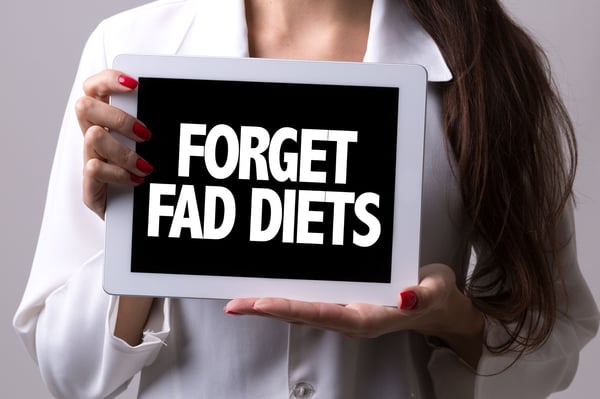Diet Distress: 10 Red Flags for Fad Diets

Christine Murzyn
Jan 3, 2020 9:00:00 AM • 3 min read


It’s time to ring in the new decade, 2020!!
As is common for the new year, we make resolutions for personal growth and well-being. One of the most common resolutions for Americans is improving health. With the noble resolutions to eat healthier or lose weight, so too come the not-so-noble fad diets.
Fad diets are popular for a period of time, without having standard dietary recommendations, and often promising unreasonably fast weight loss or nonsensical health improvements. They are often unfounded in science, set the dieter up for failure, and may even be harmful to long-term health.
Here are 10 important signs of fad diets to watch out for (and alternatives to try instead) before jumping on the bandwagon to try the latest trending diet.
10 RED FLAGS of FAD DIETS
-
Sounds too good to be true. If a diet sounds too good to be true, it probably is. There is no magic fast and permanently effective solution for weight loss.
→ The key to sustainable weight loss is small, manageable lifestyle changes.
-
Promises fast results. Avoid diets that promise rapid weight loss exceeding 1-2 pounds per week; drastic weight loss is not healthy, and you will most likely end up gaining that weight back as soon as you go off the diet.
→ Instead, focus on eating in a way that helps you feel nourished, satisfied, and energized.
-
No exercise component. Nutrition and physical activity are the two key components of any weight-management plan. They go hand-in-hand; ignoring one will not lead to lasting results.
→ The key to success is to find physical activities that you enjoy; aim for 30-60 minutes of activity on most days of the week (150 minutes of moderate physical activity or 75 minutes of vigorous activity per week).
-
Restrictive; limits food groups. All food groups offer healthful, nutritious options; unless you have a medical need to limit a certain food group, there is no reason to banish an entire food group from your diet.
→ Focus on a variety of nutrient-dense options from all food groups.
-
Lists “good” and “bad” foods. The only “bad” foods out there are ones that are spoiled or will make you physically ill if you eat them. Yes, there are foods that are more nutrient-dense than others, but restricting certain foods and labeling them as “bad” can lead to cravings and an unhealthy relationship with food.
→ Enjoy all foods in moderation. Make indulgences occasional and in small portions so you won’t feel guilty about treating yourself.
-
Specific food combinations. There is no evidence that combining certain foods or eating foods at specific times of day will help with weight loss. Eating the "wrong" combinations of food doesn't cause them to turn to fat immediately or to produce toxins in your intestines, as some plans claim.
→ Aim for a balanced meal from a variety of food groups at all eating occasions.
-
Expensive “miracle” products. Don’t buy into gimmicks. There is no magic diet pill, meal replacement smoothie, or elixir that will exclusively make you keep weight off. These also often lack scientific evidence and are not proven to be effective.
→ There are plenty of nutritious options that can fit into your budget at the grocery store Check out December’s Blog on How to Become a Grocery Guru: There is no need to waste your money on expensive supplements or shakes.
-
Claims based on before-and-after photos. Ads that rely solely on weight loss photos to sell their product likely do not have real science to back their claims.
→ A successful diet plan is one that is extensively studied and supported by sound, reliable research.
-
Based on anecdotal evidence or celebrity endorsements. These endorsers probably get paid to advertise. Moreover, just because a diet worked for one person does not mean it will work for you.
→ Follow your own plan and what works best for you.
10. Based on a single study only or misrepresented scientific studies. Just because a singular study concluded merit to a certain diet, does not mean it is so in every case. It is important to cross-check multiple studies, since scientific studies may be misrepresented by the media.
→ It is important to examine all claims critically. Consult a dietitian to help determine the best plan for you.
In 2020, set yourself up for success, not failure by fad diets. Best strategies for healthier diets include those that are sustainable, balanced, inclusive, feasible, enjoyable, and holistic.
For more information on successful diet strategies, don’t miss out on the FREE nutrition seminar, Diet Distress, Tuesdays at 6 PM in LivRite University (Fishers location).
STAY UP TO DATE WITH THE LATEST NEWS
Subscribe to our newsletter
STAY UP TO DATE WITH THE LATEST NEWS
Subscribe to our newsletter
